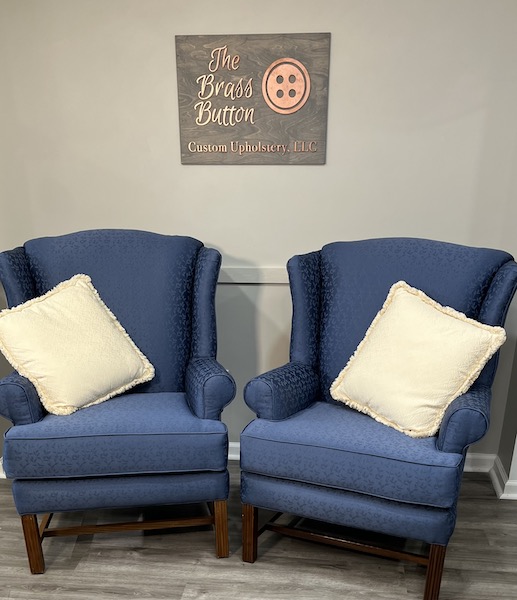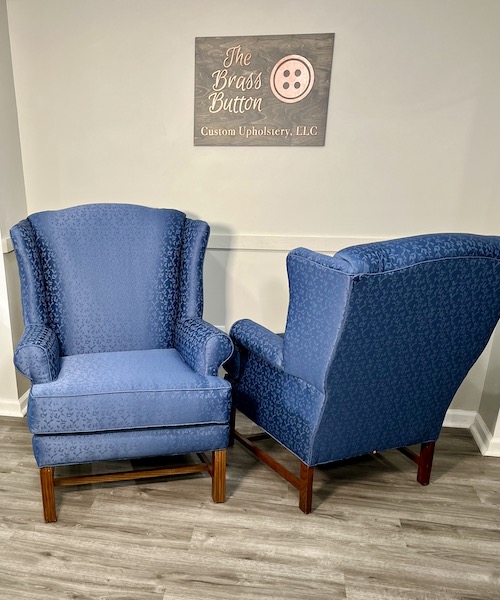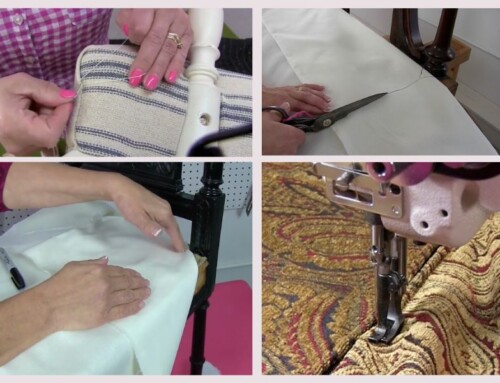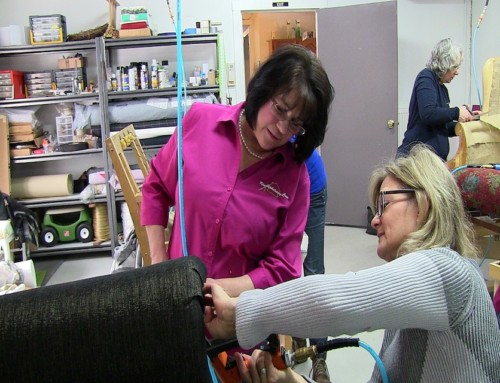Blog written by Denise Bryan
I recently delivered a pair of custom upholstered wing chairs to a client. At delivery, the smiling, delighted client asked for arm covers, which weren’t in the original job, and she asked for them to be made in a very specific way. More fabric had to be ordered to construct these arm caps, which took some time. Ten days after delivering the chairs I delivered the arm covers. The client was happy with the arm covers, and she was still delighted with her chairs. She told me about showing the wing chairs to her friends and visitors at the garden club open house she hosted. Did I mention she was STILL delighted? Honestly, this was not what I was prepared to hear.
Yikes, I feel like an Imposter.
Whenever I deliver a piece of furniture, I fully expect that after the client has lived with it for a day or two, it will completely fall apart; alternatively, they will decide they hate it or that it’s shoddy work. Even though I have never been told a piece I upholstered fell apart or was shoddy work, I know this is not rational, but somehow I still expect to hear it. This irrational work or production anxiety is called Imposter Syndrome, Imposter Phenomenon, or Impostism.
70% Struggle with this so you’re not alone!
Imposter Syndrome first came to light in 1978, and the percentage of people who have struggled with Imposter Syndrome at one time or another is believed to be as high as 70%. 70% of us have struggled with feelings of unworthiness based on who we are and what we do! While Imposter Syndrome is not an actual mental health disorder (you won’t find it in the DSM) it does appear to be a widespread, shared human experience not bound by achievement, years of experience, or awards.
Some of the people we admire most, celebrities, as well as highly accomplished members of our society, also struggle with feelings of self-doubt and unworthiness in their chosen pursuits.
In a recent Kim’s Upholstery Community Forum members shared how they have wrestled with Imposter Syndrome. Here’s a bit of what our members had to say:
Kelly N.- What an invaluable conversation! I heard myself say to a friend once, “I’m not a professional but I do professional work!” Is there a difference really? … Trying to curb that negative self-talk is a daily practice!
Mary P. – Imposter syndrome can actually be beneficial if we genuinely care about our work and value the opinions of others. Embracing imposter syndrome means acknowledging its normalcy and channeling it into productive actions… Imposter Syndrome. Experience it! Live it! LOVE it!
Monica R. – I experience this exactly as you described it. . Every time. I’ve noticed something interesting, though. I tend to view my pieces more favorably once I’ve had some distance from them. If I cover the piece up for a few days to stop myself from examining it, I am able to better appreciate it
Bonnie D. – I think for me it’s been only the last year where I don’t question my work, even though I know I put my best into it!! When you are so excited for the day of pickup, you know you’ve made it!!!
What is the answer to Imposter Syndrome? How do we reclaim our confidence? Chris Palmer of the American Psychological Association gives seven helpful tips for How to Overcome Imposter Phenomenon. Additionally, Kim’s Upholstery Community members have found the following approaches helpful in addressing our own episodes of upholstery-related Imposter Syndrome.
- As you’ve seen in the member responses above, we share our feelings. In Kim’s Upholstery Community as we started to share these feelings of inadequacy a snowball of support and care emerged. There was a huge boost of confidence from other upholsterers in the Community who walk the same path, and who share the same learning journey. This is powerful encouragement.
- We share successes. Kim has a space in the Community for posting your successes. Take the opportunity to crow a bit! You’ve earned it!
- Progress over perfection. This is a hard one. None of us is perfect. With each project, take time to reflect on what progress you’re making. Look for ways you’re still growing. “This pattern match isn’t perfect, but it’s getting so much easier! What should I try next?”
- We are compassionate. When you feel Imposter Phenomenon creeping up, engage in honest and positive self-talk. “Look at all my successes. I’m feeling really proud of ________________. One thing I am getting better at is __________.”
Imposter syndrome is a ubiquitous, uniquely human experience. Don’t let it hold you back.
We look forward to seeing YOU inside the membership,
Denise Bryan
Note from Kim:
- If you produce the best possible work and do not let things go, you are a good upholsterer.
- If your clients are happy and passing on your information, you are a good upholsterer.
- If you fret over every detail you are a good upholsterer.
We all have things we can strive to do better or more efficiently, but we care about the end product and fuss over it until it’s good, not just good enough. As a result, we are good upholsterers. Don’t undervalue what you bring to your clients as long as you are making it your best and getting better every time ❤️. Many here do good upholstery because they love DIY and want beautiful homes. You, too, should be proud to say, “I did this!!”







